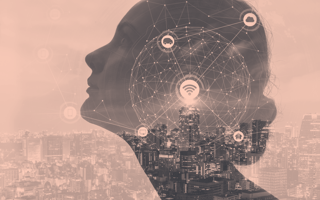
Artificial intelligence has already had a major impact on the tech industry. The numerous products and applications that now run on AI have allowed businesses and consumers alike to streamline everyday tasks and save valuable time.
As AI becomes more readily available, it will continue to become more prominent in other industries. Below, a panel of Young Entrepreneur Council experts shared which fields they believe artificial intelligence will disrupt next and why. Keep an eye out for AI-powered trends in these 14 industries.
14 Industries Primed for Disruption by AI
- Bookkeeping and accounting.
- Transportation.
- E-commerce.
- Travel.
- Content writing.
- Recruitment.
- Cybersecurity.
- Film.
- Education.
- Technical support.
- Healthcare.
- Logistics.
- Streaming entertainment.
- Natural language processing.
1. Bookkeeping and Accounting
Every business in the world needs bookkeeping and accounting services, and the traditional model — manual, error-prone and slow — has remained largely the same for decades. Automating human-intensive tasks to produce more accurate financial statements, allow finance experts to scale and provide business leaders access to important financial insights in real time are examples of the benefits of AI in this industry. —Swapnil Shinde, Zeni Inc.
2. Transportation
AI has been, and will continue to be, a disruptor within the transportation arena. We are already seeing it in services like Uber Freight. Despite the benefits these types of AI offer, however, nothing can truly replace the expertise of the people in this industry. There isn’t a one-size-fits-all solution when it comes to moving freight, as it can be a complex process, so human touch will always be necessary. —Kristy Knichel, Knichel Logistics
3. E-Commerce
AI will disrupt e-commerce, though it already has to some extent. Think chatbots: This tool will continue to become more widespread and more intelligent as its prevalence rises. In theory, bots will solve customer problems and save businesses money. —Andrew Schrage, Money Crashers Personal Finance
4. Travel
I believe we will see a big boost in travel over the next year, and AI is capable of helping people figure out the flight routes and prices that best fit their budget. Moreover, many travel agencies will use AI to analyze consumer behavior and make personalized suggestions based on their past trips. —John Brackett, Smash Balloon LLC
5. Content Writing
AI will disrupt content writing, especially short-form content. This disruption may not necessarily reach journalism, but certainly in terms of informational topics. AI systems are getting really good at understanding natural language processing. As such, I think content writing could easily be enhanced with AI. —Cody Candee, Bounce
6. Recruitment
AI has touched virtually every industry already, but I suspect we’ll watch it make even bigger strides in recruitment soon. People have tried to bring AI to hiring for years, though not without obstacles. Now, however, we’re starting to see sophisticated machine learning algorithms go deeper than resume keywords to make meaningful matches between candidate and job. It will be exciting to see how this reshapes the way we all hire. —Miles Jennings, Recruiter.com
7. Cybersecurity
Today, AI has advanced so much that soon it will be able to track and stop cyberattacks on high-profile enterprises before they even occur. We will be able to train AI to exhibit reasoning based on existing data from various past cyberattacks and malware so companies will be able to task it with continuously monitoring for signs of such attacks. —Josh Kohlbach, Wholesale Suite
8. Film
I think AI’s disruption of the film industry will be an interesting one. Artificial intelligence has the capability to watch every movie ever made, read every review and then put together “optimized” movies based on the audience’s perceived likes and dislikes. This practice can also apply to advertising and marketing where AI learns what works best in terms of visuals when selling to consumers. —Emily Stallings, Casely, Inc.
9. Education
Now that we see how thoroughly staying online is possible, providing convenient, time- and money-saving options, offering AI options for learning, training and education is a great idea. Since teachers aren’t always able to teach according to each individual student’s pacing and availability, having AI as an option is just so convenient and timely. —Daisy Jing, Banish
10. Technical Support
One industry AI can disrupt is technical support. AI-supported voice assistants can help tech support teams simplify their jobs to a great extent. —Thomas Griffin, OptinMonster
11. Healthcare
Artificial intelligence will continue to make the rounds in healthcare. It can collect crucial patient data and use predictive analytics to help doctors and medical professionals make decisions. Health chatbots are already starting to make an impact by collecting patient feedback and speeding up medical processes. —Stephanie Wells, Formidable Forms
12. Logistics
AI is obviously having a big effect on many industries, but one worth noting is logistics. This industry is closely tied to the digital age. For example, the growth of Amazon and e-commerce in general has created the need for more advanced logistics as companies need to ship products as quickly and efficiently as possible. AI will play a large role in the continued development of this discipline. —Kalin Kassabov, ProTexting
13. Streaming Entertainment
We will see more people break away from traditional cable than ever before over the next several years. AI now powers countless entertainment channels like Netflix and HBO Max. These applications monitor user behavior and deliver personalized experiences. We expect to see cable fade into obscurity by 2025. —John Turner, SeedProd LLC
14. Natural Language Processing
Although there have been hiccups, AI is set to improve how content is made for marketing and other purposes. Natural language processing has grown in leaps and bounds, and we’re already experimenting with AI-based content generators. Today, writers can use such tools to assist but not completely replace their own writing work. —Syed Balkhi, WPBeginner




